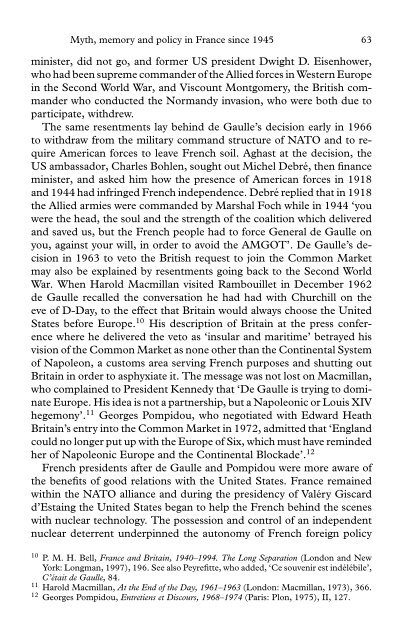Memory and Power in Post-War Europe: Studies in the Presence of ...
Memory and Power in Post-War Europe: Studies in the Presence of ...
Memory and Power in Post-War Europe: Studies in the Presence of ...
You also want an ePaper? Increase the reach of your titles
YUMPU automatically turns print PDFs into web optimized ePapers that Google loves.
Myth, memory <strong>and</strong> policy <strong>in</strong> France s<strong>in</strong>ce 1945 63<br />
m<strong>in</strong>ister, did not go, <strong>and</strong> former US president Dwight D. Eisenhower,<br />
who had been supreme comm<strong>and</strong>er <strong>of</strong> <strong>the</strong> Allied forces <strong>in</strong> Western <strong>Europe</strong><br />
<strong>in</strong> <strong>the</strong> Second World <strong>War</strong>, <strong>and</strong> Viscount Montgomery, <strong>the</strong> British comm<strong>and</strong>er<br />
who conducted <strong>the</strong> Norm<strong>and</strong>y <strong>in</strong>vasion, who were both due to<br />
participate, withdrew.<br />
The same resentments lay beh<strong>in</strong>d de Gaulle’s decision early <strong>in</strong> 1966<br />
to withdraw from <strong>the</strong> military comm<strong>and</strong> structure <strong>of</strong> NATO <strong>and</strong> to require<br />
American forces to leave French soil. Aghast at <strong>the</strong> decision, <strong>the</strong><br />
US ambassador, Charles Bohlen, sought out Michel Debré, <strong>the</strong>n f<strong>in</strong>ance<br />
m<strong>in</strong>ister, <strong>and</strong> asked him how <strong>the</strong> presence <strong>of</strong> American forces <strong>in</strong> 1918<br />
<strong>and</strong> 1944 had <strong>in</strong>fr<strong>in</strong>ged French <strong>in</strong>dependence. Debré replied that <strong>in</strong> 1918<br />
<strong>the</strong> Allied armies were comm<strong>and</strong>ed by Marshal Foch while <strong>in</strong> 1944 ‘you<br />
were <strong>the</strong> head, <strong>the</strong> soul <strong>and</strong> <strong>the</strong> strength <strong>of</strong> <strong>the</strong> coalition which delivered<br />
<strong>and</strong> saved us, but <strong>the</strong> French people had to force General de Gaulle on<br />
you, aga<strong>in</strong>st your will, <strong>in</strong> order to avoid <strong>the</strong> AMGOT’. De Gaulle’s decision<br />
<strong>in</strong> 1963 to veto <strong>the</strong> British request to jo<strong>in</strong> <strong>the</strong> Common Market<br />
may also be expla<strong>in</strong>ed by resentments go<strong>in</strong>g back to <strong>the</strong> Second World<br />
<strong>War</strong>. When Harold Macmillan visited Rambouillet <strong>in</strong> December 1962<br />
de Gaulle recalled <strong>the</strong> conversation he had had with Churchill on <strong>the</strong><br />
eve <strong>of</strong> D-Day, to <strong>the</strong> effect that Brita<strong>in</strong> would always choose <strong>the</strong> United<br />
States before <strong>Europe</strong>. 10 His description <strong>of</strong> Brita<strong>in</strong> at <strong>the</strong> press conference<br />
where he delivered <strong>the</strong> veto as ‘<strong>in</strong>sular <strong>and</strong> maritime’ betrayed his<br />
vision <strong>of</strong> <strong>the</strong> Common Market as none o<strong>the</strong>r than <strong>the</strong> Cont<strong>in</strong>ental System<br />
<strong>of</strong> Napoleon, a customs area serv<strong>in</strong>g French purposes <strong>and</strong> shutt<strong>in</strong>g out<br />
Brita<strong>in</strong> <strong>in</strong> order to asphyxiate it. The message was not lost on Macmillan,<br />
who compla<strong>in</strong>ed to President Kennedy that ‘De Gaulle is try<strong>in</strong>g to dom<strong>in</strong>ate<br />
<strong>Europe</strong>. His idea is not a partnership, but a Napoleonic or Louis XIV<br />
hegemony’. 11 Georges Pompidou, who negotiated with Edward Heath<br />
Brita<strong>in</strong>’s entry <strong>in</strong>to <strong>the</strong> Common Market <strong>in</strong> 1972, admitted that ‘Engl<strong>and</strong><br />
could no longer put up with <strong>the</strong> <strong>Europe</strong> <strong>of</strong> Six, which must have rem<strong>in</strong>ded<br />
her <strong>of</strong> Napoleonic <strong>Europe</strong> <strong>and</strong> <strong>the</strong> Cont<strong>in</strong>ental Blockade’. 12<br />
French presidents after de Gaulle <strong>and</strong> Pompidou were more aware <strong>of</strong><br />
<strong>the</strong> benefits <strong>of</strong> good relations with <strong>the</strong> United States. France rema<strong>in</strong>ed<br />
with<strong>in</strong> <strong>the</strong> NATO alliance <strong>and</strong> dur<strong>in</strong>g <strong>the</strong> presidency <strong>of</strong> Valéry Giscard<br />
d’Esta<strong>in</strong>g <strong>the</strong> United States began to help <strong>the</strong> French beh<strong>in</strong>d <strong>the</strong> scenes<br />
with nuclear technology. The possession <strong>and</strong> control <strong>of</strong> an <strong>in</strong>dependent<br />
nuclear deterrent underp<strong>in</strong>ned <strong>the</strong> autonomy <strong>of</strong> French foreign policy<br />
10 P. M. H. Bell, France <strong>and</strong> Brita<strong>in</strong>, 1940–1994. The Long Separation (London <strong>and</strong> New<br />
York: Longman, 1997), 196. See also Peyrefitte, who added, ‘Ce souvenir est <strong>in</strong>délébile’,<br />
C’était de Gaulle, 84.<br />
11 Harold Macmillan, At <strong>the</strong> End <strong>of</strong> <strong>the</strong> Day, 1961–1963 (London: Macmillan, 1973), 366.<br />
12 Georges Pompidou, Entretiens et Discours, 1968–1974 (Paris: Plon, 1975), II, 127.
















